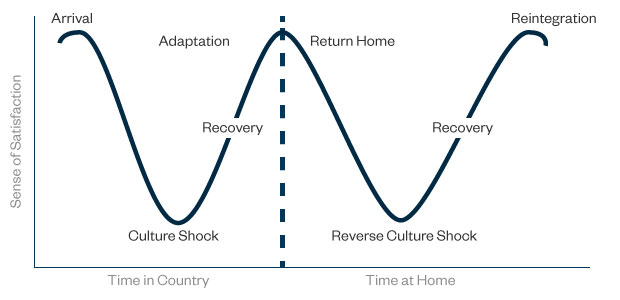
“Mom, why is he stopping?” asked my 7-year-old when we were on holiday in Singapore, and our taxi driver stopped at a (red) traffic light. I stared at her incredulously because we had only been living in Shanghai for about four months. It then occurred to me how quickly young children adapt to their environments, and why running a light suddenly seemed perfectly normal to her. While young children seem to acclimate quickly, it’s that time of year when older kids or adults may become stressed about the prospect of going ‘back home.’ Whether it’s for repatriation or just for the summer, elements of reverse culture shock can be at play as illustrated in the innocent example of my daughter’s comment. I get annoyed that I have to carry a physical wallet around because suddenly I can’t use WeChat or e-cards. I mean c’mon, shouldn’t the rest of the world be on board with WeChat by now?
First world problems aside, going ‘back home’ even for the summer can be daunting, even if you aren’t repatriating. If your usual home is rented out or you have sold it to come overseas, staying with friends or relatives or having to move around is, in itself tiring and inconvenient. Another element of ‘reverse culture shock’ or ‘re-entry shock’ is noticing how much you have changed while being overseas, and how your view of the world is now different to friends or family back home. It can be even harder when some may seem unwilling to hear about your ‘adventures’ abroad and the ‘glamorous expatriate lifestyle’ because it is far removed from what they know. They might also be envious, or they aren’t interested, and their behavior can make it difficult to acclimate. Someone likened it to Dorothy from The Wizard of Oz, going back to black and white after a world of technicolor.

[Image via Interexchange.org]
So, how does one deal with this and also help their children? Psychologists have said there is a ‘U’ shaped experience of reverse culture shock. After the initial euphoria wears off, that's when you find yourself feeling out of place in your own culture - that’s the bottom of the curve. The good news is, you will begin a gradual adjustment back towards feeling comfortable again. For adults, sharing your experiences with close friends who will support you with open ears and legitimate interest is a tip for surviving this. Secondly, maintain your lifestyle and stay international, remembering that as a ‘repat’ you shouldn’t have to give this up just to fit in. “Remember that being flexible and expecting the unexpected helped you get through the difficult times abroad. The same attitude can help you back home,” reports the Office of International Studies at Northeastern University. The third is simply accepting that you have changed and that friendships may have to evolve or change together with this – it’s just part of life. Be patient with yourself in finding your ‘new place’ and ‘new self.’
Helping your kids get through reverse or re-entry shock can either be more complicated or easier, depending on their ages and personalities. Here are some tips for managing this with younger children:
- Watch out for changes in behavior, such as becoming more withdrawn, ‘acting up’ and mood swings. Often the most commons sign is, “I want to go back to XYZ” – usually the last country they lived in, so encourage your child to talk about it.
- Don’t tell your child you’ll be moving back home ‘soon’ if you aren’t, and don’t say you are going back to ‘visit XYZ’ if you aren’t. One of the main problems, especially with very young children, is their difficulty in comprehending distance and time. They may believe their old friends from their previous home can just come over for a visit; they may not understand that they aren’t on holiday and that this is their new home now. All you can do is be honest, talk it through and use plenty of distractions to encourage positivity towards the new home.
- Inside your new home, make their bedroom as familiar as possible. Have a selection of well-loved DVDs available, so they can chill out and relax. You may want them to integrate into the new culture, but everyone needs a bit of ‘down time’ and stress relief sometimes.
- The unavailability of familiar food is often a breaking point too. So, one of the first things you can find is a box of their favorite breakfast cereal! While they will soon get used to the new menus, it won’t harm them to have a treat from the country they remember from time to time.
- Gain closure on their experience by visiting favorite places and friends or having a going-away party.

Older children and teens often struggle with losing friends and a fear of ‘fitting in’ at school. Things to do for this age group could include the following:
- Encourage and facilitate them to get involved in the new home environment, in extra-curricular activities, sports and youth organizations.
- Instill in your kids or teens a healthy sense of self-worth. If children know that they have intrinsic value as people, struggles with ‘fitting in’ may not be as challenging.
- Encourage them to keep in touch with friends abroad and at home (through social media or other methods).
- Advise them to be discreet inititally about who they share their experiences with if others won’t appreciate it the same way they do.
- Tell them not to judge other teens too harshly - it's essential to make new friends.
- Remind them not to be too hard on you as their parents (as you are also going through your version of re-entry stress).
- Know that the stress will pass.
Eventually, for both adults and children, you will reach the top of the ‘U’ curve again and settle back into your home as the ‘new you.’ Happy holidays to those going home or away for summer and good luck to those repatriating!

[Images via pexels.com]
For more Dragon Mama, click here.


















